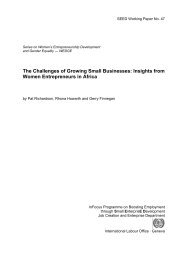manual: women workers' rights and gender equality - International ...
manual: women workers' rights and gender equality - International ...
manual: women workers' rights and gender equality - International ...
You also want an ePaper? Increase the reach of your titles
YUMPU automatically turns print PDFs into web optimized ePapers that Google loves.
paid by the employer. ILO experience has learned that it is better not to make the provision of<br />
child care facilities obligatory only for companies with many <strong>women</strong> workers as this leads to<br />
discrimination in access to employment against <strong>women</strong> in practice.<br />
Another provision given in the Labour Act 1997 is the possibility of special leave (chapter 6, section<br />
7). The employer has the right to grant a worker special leave during the event directly affecting<br />
the worker’s immediate family (see session about time to work, overtime <strong>and</strong> leisure time for more<br />
details about special leave).<br />
The fact that only these two provisions are mentioned in the Labour Act 1997 does not mean that<br />
workers can not ask their employers for other measures to support workers with family<br />
responsibilities. Possible measures can be:<br />
- Change of attitude: to encourage sharing family responsibilities between men <strong>and</strong> <strong>women</strong><br />
- Provision of parental leave<br />
- Provision of leave for sick family members<br />
- Facilities for the elderly<br />
- Flexible working arrangements<br />
Of course this needs investments from all: men <strong>and</strong> <strong>women</strong> workers, the Government <strong>and</strong><br />
employers. They should share the costs of care for children <strong>and</strong> the elderly. Employers who offer a<br />
family-friendly workplace find their reward through increased motivation <strong>and</strong> productivity of their<br />
workers.<br />
Stimulate the participants to discuss the problems they face. Most probably a lot of them have the<br />
same kind of problems. Discuss how they cope with it. Stimulate them to come up with ideas how<br />
they want <strong>and</strong> can change their situation before mentioning possible measures. Of course it will<br />
take time to change things but doing nothing means no change at all. Tell them that they are<br />
stronger in a group than alone. Give them suggestions on where they can get support (trade<br />
unions <strong>and</strong> other organizations).<br />
Related sessions <strong>and</strong> briefing notes<br />
4.3 Equality at Work<br />
Briefing Note 7 Decent Work, Workers <strong>and</strong> their Rights<br />
Briefing Note 9 Violation of Rights at Work: File a Complaint<br />
102

















